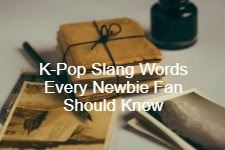K-Pop Slang Words Every Newbie Fan Should Know
Korean Expressions for Ultimate Fans
1. Bae: means husband in Korean, and it is usually used by K-pop fans jokingly when talking about their favourite idol member or their favourite actor who they love.
2. Sang-Namja: means a real man and it is usually used to refer to a strong guy, many times a person with wide shoulders is referred to using Sangnamaja
3. Daesang: The biggest award an actor could get for stunningly presenting his role in the drama.
4. Sunbae: A Senior on the job
5. Hoobae: A Junior schoolmate or colleague
6. Second Lead Syndrome: When a fan watched a drama with two great actors and he or she are unable to root for the first male lead only, it means she fell for the second lead.
7. Netzines: Korean internet community are usually referred to using this word
8. Maknae: The youngest member in an idol group or in a workplace.
9. Fighting: It doesn't mean encouraging a fight, this means good luck in Korean as used by multiple actors in most dramas. It could also mean don't give up based on the situation.
10. Sasaeng: Stalker fans are referred to as Saesang they are hated fans in the community because they hurt their fav idols and actors.
11. Bias and Ultimate Bias: The favourite member in an idol group is usually referred to as a bai.
12. Daebak: means it is amazing and it usually used when amused by something
13. Hallyu: The Korean wave is also referred to as the Hallyu wave.
14. Omo: The Korean version of OMG
15. Kamsamida: meaning thank you
16. Ahjushi: means uncle or old man, usually used to refer to someone older in social gatherings and public areas. It is also used as a rude term when speaking during fights.
17. Unni: used as a term of endearment for an older female
18. Oppa: used as a term of endearment for an older male
19. Ahjuma: means aunt or old lady and it is used to refer to an older woman in both social gatherings and during fights.
20. Harboji: Grandpa
21. Halmoni: Grandma
22. Aegyo: means acting cute
23. Annyeonghaseyo: meaning hi or nice to meet you.
Now you know what to translate these terms to if you see them in a subtitle or an article somewhere. Mention other terms in the comments if you know more. Who knows this article could become a good reference for all fans in the near future.




Comments
Post a Comment